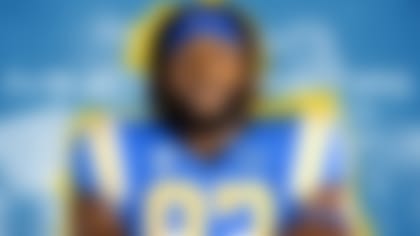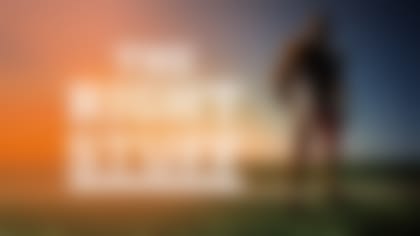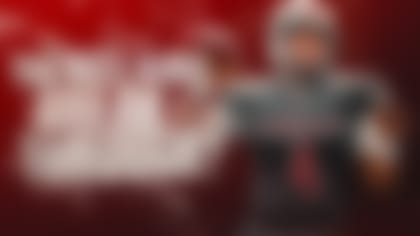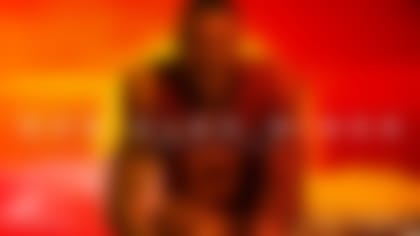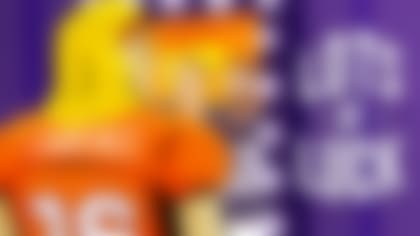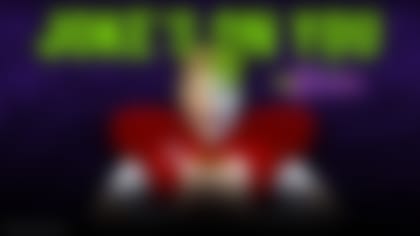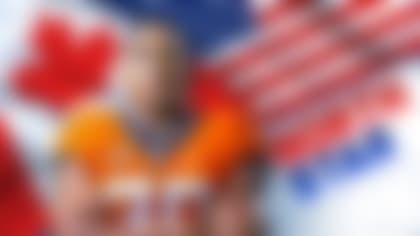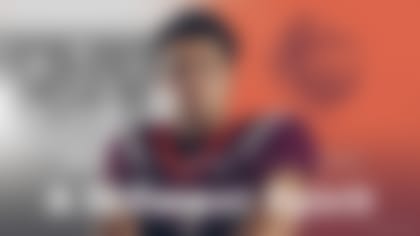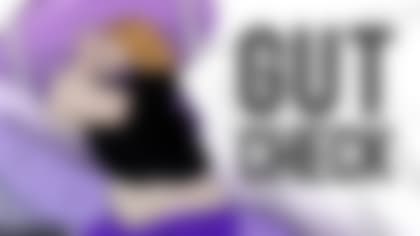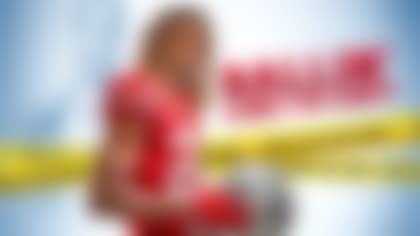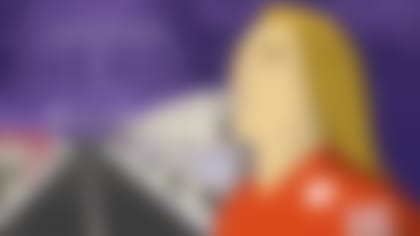Mental illness struck Osa Odighizuwa's family twice -- first his father, then his brother. Now, it's personal for the Dallas Cowboys' third-round draft pick, who wants ş£œ»…˙AV locker rooms to be spaces where players in crisis can seek help. And he wants it to start with him.
By Chase Goodbread | May 1, 2021
At UCLA's Dodd Hall, Osa Odighizuwa first took his seat for Sociology of Mental Illness in the winter quarter of 2019. A thousand miles north in Portland, his older brother, Owa, was feeling lost.
Osa wasn't aware of his brother's plight at the time; indeed, Owa wasn't yet even fully aware of his own. He knew Owa's ş£œ»…˙AV career had unraveled abruptly, and that his own dream the brothers would one day be in the league together -- maybe even as teammates -- was finished. It was a dream that came apart just as Osa was beginning to show signs of being able to fulfill his end of it. He had finally established himself on UCLA's defensive line, starting the final eight games of the 2018 season. He wasn't a star player yet, but after redshirting the 2016 season and playing a backup role in Year 2, his path to the ş£œ»…˙AV had at least moved forward in a more meaningful way.
Meanwhile, Owa's ş£œ»…˙AV career was feeling anything but meaningful.
Owa, who also played D-line at UCLA, was a third-round selection of the New York Giants in 2015, when Osa was still at David Douglas High School in Portland. His pro career was brief -- wrought with injuries, a PED suspension that stamped his release by the Giants and personal struggles with mental health, including depression that hadn't yet been diagnosed. It didn't occur to him for years he might need help. He knew something about his personal headspace wasn't right, but for too long he did what too many people in the same position do: Nothing.
"He didn't really talk about his issues too much. We mainly started talking about it after his time in the ş£œ»…˙AV," Osa said in a recent interview. "That was when he started opening up to me about some of the things he was going through."
When Owa finally began confiding in the youngest of his three brothers about his depression, it was too late to save his football career; his second chance with the Buffalo Bills began and ended in the 2018 offseason before he ever got to play another ş£œ»…˙AV game. A third chance never came.
He had always been a leader for his three brothers, a role that was thrust upon him at an early age when his mother, in 2002, moved her boys across the country to Portland to begin a new life as a single parent. Osa had always been the dutiful listener when it came to Owa's direction.
That guidance never really ended. Owa's brief but troubled experience in the ş£œ»…˙AV has allowed him to create something of a roadmap for Osa -- what to watch for, what to embrace, what to avoid. It began years ago, and with any luck for Osa's pro career, it won't end for many years to come.
Osa was selected Friday night by the Dallas Cowboys in the third round of the draft – No. 75 overall, just one pick later than his brother went to the Giants in 2015. As he enters the pro ranks, he's already benefitted from Owa's advisement on everything from injury prevention to training to agent selection. Like he always did as a kid, Osa has listened to every word. Sometimes he breaks from his brother's advice and makes a different decision. But maintaining good mental health is one cue from his brother that Osa will always take seriously.
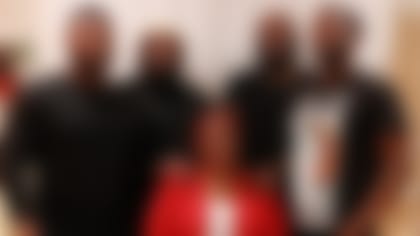
Owa Odighizuwa's struggles with depression weren't the first time mental illness had impacted his family.
Owa took on something of a fatherly role among his three younger brothers beginning at age 9, when his mother Abieyuwa Odighizuwa fled Grundy, Virginia, immediately after a tragic shooting at the Appalachian School of Law.
Her husband, Peter, a 43-year-old student who had been dismissed for failing grades, at the school on Jan. 16, 2002, killing three, including the dean, a professor and a fellow student. Diagnosed after his arrest with paranoid schizophrenia, Peter Odighizuwa was eventually given three life sentences without the possibility of parole. The incident released Abieyuwa from an abusive relationship, but also placed her in a difficult position with four young children. Concerned for their safety, she quickly moved what was left of her family to Portland, where she had lived once before. Osa, just 3 at the time, has no memory of the incident. Owa, as the oldest brother, was impacted in a more significant way.
"I told them there would be a lot of changes after (the shooting). We can't be on different pages; we have to be a unit," Abieyuwa recalled. "(I said) if you want me to defend you, you can't tell me you're at Point A, then you get in trouble at Point B. As Owa got older, when I had to work, I told him he had to be in charge."
Two years after moving to Portland, with sons aged 11, 10, 9 and 5, Abieyuwa took a night-shift job as a certified nursing assistant at Portland's Providence Medical Center and charged her oldest with some leadership tasks. Chief among them was cooking an occasional meal for his brothers -- Owa took a culinary class and knew his way around a George Foreman grill -- and getting his brothers ready for school.
Abieyuwa's shift ended at 7:30 a.m. Her first day on the job, she called Owa at 5:30 to wake him up and tell him to tend to his siblings. Around 7:45, she pulled up to their residence and honked the horn, pensively watching to see what state of readiness would emerge. The door opened, and the four boys walked out prepared for school, breakfast-fed and looking sharp.
"That gave me the peace that he could do that every morning," she said. "And he never failed at it all the way through high school."
Even at 5, Osa was responsive to Owa's direction and guidance. The youngest of four might figure to be the most resistant to a brother's authority, but it wasn't the case. This was the foundation of a relationship that ultimately provided Osa with a key mentor, his best sounding board and his best confidant even now as he begins a career for which Owa knows the many pitfalls.
"Osa has always listened," Owa said. "But he's still his own man making his own decisions."
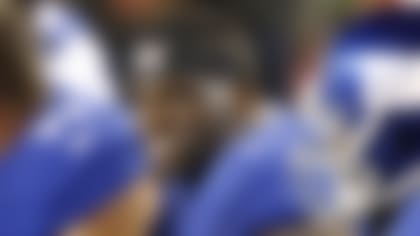
It would take more than one finger to point to everything that Owa believes led to his mental health being compromised while with the Giants. There was a "toxic" personal relationship. There was a foreboding sense that, even when healthy, he was hopelessly stuck behind talented incumbent starters Jason Pierre-Paul and Olivier Vernon. But most of all, there was a string of injuries that kept him off the field for much of his two-plus years in New York and saddled him with a feeling of worthlessness to the team.
"My rookie year, I couldn't enjoy myself. I thought, I haven't earned anything," Owa said. "Why would I go out and have a good time when I haven't played yet? I wouldn't leave my house -- I'd go straight home from practice."
An unusual foot injury cost him 12 games his rookie year in 2015. The following season, he sustained a ruptured ligament in his thumb. He continued practicing with the injury and was available for most of the season, but played very little. Then a hamstring injury kept him out of a playoff loss to the Green Bay Packers.
As the injuries mounted, so did his stress.
Feeling overwhelmed, he posted a vague string of since-deleted Twitter posts that led fans to believe, erroneously, that he intended to retire. He regrets the postings now, but said he was merely suggesting he might need a break from team activities.
The tweet that drew the most attention read: I have all love for everyone.. at the point and time I believe it's in my best interest to take sometime to get away from the game.
Among the triggers for Owa's despair, he believes, was an exit meeting with a Giants coach -- he didn't identify which coach -- coming out of the 2016 season. In that meeting, a simple and hard reality about pro football was emphasized.
"I was sat down (by a coach) and told [that] 'guys who don't stay healthy aren't around very long.' He was letting me know what could happen," Owa said. "That kind of stressed me out, like, I've got to figure this thing out. I've got to stick around somehow, some way. So that led me to do some things that I really regret and that I wish I could take back. It's all stuff I'm trying to pay forward to my brother to make sure he never does those things."
Owa wishes most that he could reverse his decision to take a performance-enhancing drug in order to help his body heal more quickly. The compulsion was to stay in the ş£œ»…˙AV long enough to reach a second contract; only about a quarter of the $3.16 million rookie contract he signed was guaranteed. But within a day of his positive test and subsequent four-game suspension becoming public, he was released by the Giants. Just 28 months after being drafted, he was all but finished in the league.
"I was (already) dealing with mental health issues at the time," he said. "I was dealing with some craziness off the field, with the decision I made to take the performance-enhancing drug, and it was a whirlwind of nonsense that robbed me of my opportunity to even get me on the field for a third season."
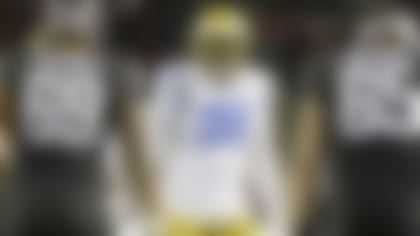
With a lifetime of experience as an engaged listener, Osa wouldn't mind being the player his new Dallas Cowboys teammates can go to in times of personal crisis. He wants to be this player in part because he knows his brother either didn't have such a teammate when he was with the Giants, or at least didn't feel like he knew who that teammate was. At the same time, he also understands that maintaining such a status within an ş£œ»…˙AV locker room is best paired with on-field success.
"I'll be someone people can confide in in a judgment-free space, while also remaining my positive self," he said. "I would want teammates to feel like they can come to me with a problem and know I will listen and be there without judging anyone."
In a league of more than 2,100 players, it's easy to be dismissive about how much impact one single player can have. But focus groups gathered by the ş£œ»…˙AVPA suggest players are increasingly more willing to discuss mental health issues, and that small groups like the one-on-one settings Osa is willing to engage in are where positive breakthroughs usually happen.
The ş£œ»…˙AVPA considers team clinicians to be the first option to whom players can turn, but not all want to go there. The second option offers up to eight free sessions with a counselor, covered under the health insurance provided to active players, from an ş£œ»…˙AVPA-vetted list of clinicians that is password-protected for players only on the ş£œ»…˙AVPA's web site.
"Some of the barriers are, If I use my team clinician, where is that information going? Of course, team clinicians, we value them and they value their duty legally and ethically to confidentiality, but players sometimes don't necessarily trust the system they're in," said Dr. Amber Cargill, the ş£œ»…˙AVPA's Director of Player Wellness. "So, there's a big fear around, If I use my (team) clinician, and it's known that I use my clinician, is that going to be a red flag or used against me in some way?"
Owa was complimentary of the resources both the Giants and the ş£œ»…˙AVPA had in place for players to seek a mental health checkup and acknowledges he should've taken better advantage. The barriers that prevented him from seeking more timely help were common ones. First, he didn't even realize his mental health was being compromised. And even though he recognized that something wasn't right with his mental state, he had a determination -- frequently born of the stigma surrounding mental-health issues ‚Äì that he could get through it by himself. In a hyper-masculine ş£œ»…˙AV locker room environment, that sort of determination is nothing unusual.
"I didn't know the name of what this feeling was, but I was an athlete," Owa said. "I was used to pushing through things, thinking: I can navigate this. I was just trying to shove it all away. But it got to the point where I couldn't muscle through it anymore. It caught up with me."
It's that mentality Osa hopes to help end by fostering, as much as one ş£œ»…˙AV player can, a culture of openness in Dallas on the subject of mental health. And unlike his older brother, Osa won't be so reticent to express himself.
"I'm an open book. If something doesn't feel right to me, at any point, I'm calling family just so they know what's up with me," Osa said. "The emotions, I'm not going to lie and say I'm not a little bit of a bottler when it comes to emotions, but I have football -- that's my outlet for emotions. But I still get things off my chest and talk with people about whatever it is on my mind."
Stigma surrounding mental health problems, of course, goes way past the ş£œ»…˙AV locker room. The inherent determination to overcome such issues alone, so that one doesn't have to expose emotional vulnerabilities, has deep traditional and cultural roots that aren't easily replaced. The mental health class Osa took at UCLA stuck with him on multiple fronts, from recognizing symptoms to understanding that problems don't all arise from external stress; that chemical imbalances in the brain can cause mental illness, as well.
One of the many things he took away from the course was that he can make a difference. Still, ending the stigma in the ş£œ»…˙AV isn't just a player-to-player challenge; the culture within an ş£œ»…˙AV club can play a role as well, according to Cargill.
"You may have a group of players more willing to engage, but if they don't feel the club culture is permissive of that, then you're going to be stuck in the same stigma," Cargill said. "And vice versa -- if you have a group of guys not willing to go there, but you have a club culture that is willing, the stigma is still going to be there. It's an interaction of the two that needs to be on the same page."
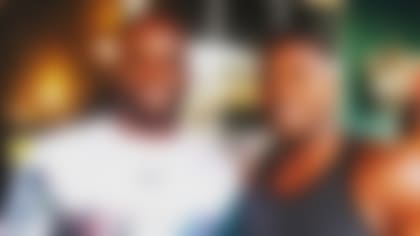
Osa has plenty of interests away from football, but music is where he thinks he could find a post-football career, perhaps as a booking agent.
"I still have a lot to learn about the music industry," he said. "I haven't started to educate myself on what it takes to be in that industry. I have a little bit, but I haven't really delved into it because football is the main thing."
Owa has pressed his younger brother to think about these things; being well-rounded with a diversity of interests, while still maintaining a strong focus on football. It is critical, he now understands, for ş£œ»…˙AV players to have an identity outside the game. Those that don't can endure something of an identity crisis beginning the day they're told they're out of the league. Owa believes his issues stemmed more from the disappointment of an unsuccessful career, but Osa thinks there was a bit more to it.
"His identity was super tied into football, so not being able play football hurt him more than he even realized himself at first," Osa said.
Few ş£œ»…˙AV players understand post-career identity crises for professional athletes better than Hayden Hurst. The Atlanta Falcons tight end had an identity crisis of his own following a failed minor league baseball career, suffered from depression and nearly lost his life in a suicide attempt while in college at the University of South Carolina. He's since established the , which supports mental health services, and is among the ş£œ»…˙AV's most outspoken players on mental health and ending the stigma that surrounds it. Maintaining an identity away from football is critically important, he said, but it's also difficult to achieve. The level of commitment required to reach the ş£œ»…˙AV, then have the staying power to garner multiple contracts, doesn't leave much time for outside business ventures or hobbies.
"That's everybody's goal: You want to get to pay day. You want to get to that second contract. But it's just so hard because of injuries that come up, and suddenly you're out of the game," Hurst said. "I've had those thoughts, too. What do I do after football? What's next?
"It's hard because you're supposed to be present, be where your feet are. But all of the sudden the rug gets pulled out from under you and you're like, 'What the hell do I do next?' You don't think about the future when you're in professional sports because it's so important to stay focused day to day, making sure you're prepared for that next meeting, that next practice, the next game, the next rep. It's hard."
Hurst said he's learned to disconnect from football when he leaves the Falcons facility each day. In independent interviews, both Hurst and Owa used the term "re-set button" in describing what a diversity of interests can do for a pro athlete. The difference?
Hurst found it.
Owa didn't.
And Osa will be ever mindful.
"I was tunnel-visioned ... I should've focused on chances to maximize myself outside of football, networking different things," Owa said. "My brother understands that if injuries happen, it's not the end of the world. We're not defined by football."
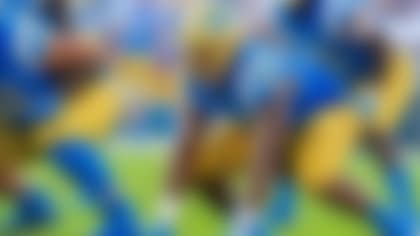
In Osa, the Cowboys are getting a player who has never been injured in any significant way. He never missed a practice at UCLA, much less a game. Other than the occasional ankle sprain, he's been all but indestructible throughout his football career, making his medical file as thin as any prospect in the draft.
It's a stark contrast to his brother, who not only suffered various injuries in the ş£œ»…˙AV, but also hip labral tears at UCLA that forced him to sit out and redshirt his senior year with the Bruins. Owa considers the mental health aspect of his guidance for Osa to be of primary importance, but years before that began, he was counseling Osa on injury prevention.
Staying injury-free requires luck, as his brother can attest, but Osa has made his own luck to some extent. His brother's injury history has compelled him to never shortcut stretching, massage and other types of treatments, or anything else outside of a workout that helps keep a football player's body in optimum condition. UCLA defensive line coach Johnny Nansen coached Osa for only a few months, having been hired in March 2020 just as COVID-19 scattered the team until the fall, but still came to learn of Owa's influence in that regard.
"He's a guy who takes really good care of his body, which is very rare these days for kids, because they're so young. At times, I don't think they all realize their moneymaker is their body," said Nansen. "Osa knew that, and that had a lot to do with his brother. When we got back to the facility (from quarantine), he was the first one stretching in the morning. And when I'd go down to the training room at the end of the day, he's in there."
Osa's durability is just one of the traits ş£œ»…˙AV scouts took note of in evaluating him for the draft.
"He's kind of a tweener from an inside-outside standpoint," ş£œ»…˙AV Media draft analyst Lance Zierlein said. "That used to be a negative, but now you can envision him in odd fronts or even fronts, so that could end up working in his favor. He's undersized, but he plays with really good snap quickness, so he's got a chance to get in there and attack in the backfield."
Zierlein compares Odighizuwa to former Notre Dame DT Sheldon Day, but with longer arms (34 inches) that should help him separate from blocks. He weighed 282 at UCLA's pro day, light for a defensive tackle, but has the athleticism to play over the center in nickel situations, according to Nansen.
"I think he was more of a pass rusher before I came in, but I told him you earn the right to pass rush, you stop the run first," said Nansen, who installed a four-man defensive front in 2020 after Osa had previously played in a three-man front. "His mindset started to change in that way. I had two ş£œ»…˙AV coaches I talked to just (last week), and I told them, 'I think you're getting a run-stopper first, and his upside as a pass rusher is going to get better because now he's creating a rush off his power moves.'"
Along with evaluating him as a player, ş£œ»…˙AV clubs also questioned Osa about his family's mental health issues in pre-draft interviews.
"Mental illness is not something I struggle with, thank God," he said.
Owa said he never got questions about their father when he was a draft prospect, but his struggles with mental health begat some pre-draft inquiries from clubs for Osa. For his part, Osa said he didn't consider the questioning to be out of line, and that it was never suggested that the problems in his family might be hereditary.
"It was fair. There's no way around it. It had to be addressed," Osa said. "I'm glad they asked me about it, to give me the opportunity to share how I feel, share my experience, rather than trying to paint a narrative. That would've been more out of line, trying to paint a narrative, without giving me a chance to explain my experience."
The Odighizuwa brothers were at a Vancouver, Washington, Chick-fil-A drive-thru about two years after Owa played his final ş£œ»…˙AV game when Owa finally began telling Osa about what were then still unidentified struggles.
Among them was a feeling of isolation, but historically speaking, he was not alone.
Former Dolphins running back Ricky Williams suffered from depression, as did former Raiders offensive lineman Barret Robbins, who infamously missed a Super Bowl due to the condition. Terry Bradshaw, though not diagnosed until years after his career with the Pittsburgh Steelers ended, battled anxiety attacks as a player. In more recent history, former Pro Bowl WR Brandon Marshall comes to mind for Owa.
"He's one who's dealt with mental health issues, and look where he's at now," Owa said. "Commentating on TV."
The Depression and Bipolar Support Alliance estimates that major depressive disorder affects 7.1 percent of American adults. Several variables make it difficult to extrapolate that number to the ş£œ»…˙AV, including that it impacts more women than men. Were the correct number only 2 percent, that would be more than one player per team.
When Owa finally opened up, he described symptoms that Osa had been studying in his Sociology of Mental Illness class. Osa told his older brother about the class, and that he was hearing a textbook definition of depression from Owa's admissions.
"I was like, 'Yeah, bro, you might have some depression you're dealing with. That's what it sounds like," Osa said. "… He said, 'You think so?' He hadn't thought anything of it."
Owa has sometimes wondered what might have become of his father had his dad gotten an early diagnosis and professional support. Peter Odighizuwa benefitted from neither. While Osa is too young to have a memory of his father's behavior, Owa recalls nothing resembling coherence.
"We spent most of our time with him, in my memory, when he was not in his right mind," he said.
Among the things Osa told Owa he'd learned in his mental health class was that people with mental illness need to first acknowledge the problem, and an admission like that requires at least one confidant who won't be judgmental. Neither of the boys were ever in a position to help their father, but now they can be that confidant for one another.
Owa said he doesn't even recall the drive-thru conversation as a seminal moment, but Osa knows this much: The next time he saw his brother, he'd opened up to more members of the family, got professionally diagnosed and had begun seeing a therapist.
Osa, who graduated last June with a Sociology degree, got a "B" in his Sociology of Mental Illness class. But he earned an "A" in how to apply it.
Owa now has a new career path, and a new purpose, as a graduation mentor at David Douglas High School, where he and his brothers attended. He's doing some life coaching on the side. He's been doing it since age 9, really, so mentoring suits him.
"This is what I believe my calling is -- to guide people, mentor them and give them knowledge and information," he said. "… The most gratifying thing is to impart knowledge upon these students on the importance of education and life and how they conduct themselves in life."
Follow on Twitter.
